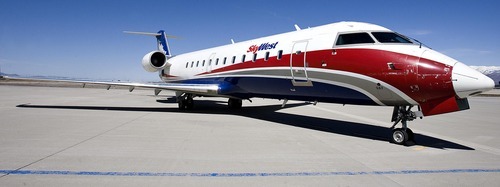This is an archived article that was published on sltrib.com in 2012, and information in the article may be outdated. It is provided only for personal research purposes and may not be reprinted.
SkyWest Inc. on Thursday capped off a difficult 2011 by announcing a big fourth-quarter loss that the regional airline attributed largely to trouble merging its ExpressJet acquisition into its Atlantic Southeast Airline subsidiary.
The St. George-based carrier lost $18 million, or 35 cents per share, in the three months ending Dec. 31. It earned $37.2 million, or 67 cents per share, in the same period of 2010.
The loss, which SkyWest didn't expect when it entered the quarter, cemented the company's first annual loss since 1988. Red ink for all of 2011 totaled $27.3 million, while a year earlier it earned $96.4 million.
"Our expectations for a near-perfect execution were unrealistic from a financial perspective. It took us longer to gain good control of the planning and financial management of ExpressJet than we had planned, which resulted in missed financial plans in every quarter of this year," SkyWest CEO Jerry Atkin said in a conference call with analysts.
Mike Kraupp, chief financial officer of SkyWest, backed up Atkin's assertion that the ExpressJet acquisition in November 2010 was "sort of a hostile-type takeover" that made it difficult to fully vet the airline's financial condition before the two sides struck a deal.
"They were not publicly marketing themselves," Kraupp said in an interview after the conference call. "We saw a carrier that was in financial stress, so we thought there was an opportunity there, [but] they didn't afford us a lot of time to spend with internal management."
Instead, Kraupp said, SkyWest examiners had to rely on ExpressJet financial statements and met only with the carrier's CEO and chief financial officer.
SkyWest's struggle with ExpressJet isn't over. SkyWest expects another loss in the first quarter, which ends March 31. Afterward, though, it forecasts moving out of the red and ending 2012 fully profitable, Atkin said.
"We have an action plan in place for 2012 that we have started to execute, and that is expected to return us to profitability for the year. Having said that," Atkin said, "we expect the first quarter of 2012 to be challenged but somewhat mitigated from our fourth-quarter 2011 results."
The recovery plan won't affect consumers or employees, Kraupp said. "That's not what this is about."
In November, ExpressJet and Atlantic Southeast Airlines (ASA) received permission from the Federal Aviation Administration to operate as a single carrier. The ASA name was retired, and the two airlines became known as ExpressJet. But by then, problems were piling up. At the close of 2010, ASA received a "substantial" cut in payment rates from its major partner, Delta Air Lines, Atkin said. The cut affected SkyWest during all of 2011.
Large numbers of ASA and ExpressJet aircraft were out of service while they were being repainted. ExpressJet aircraft needed to indicate that they were flying as Delta Connection for Delta Air Lines; ASA jets were repainted to show they were operating as United Express for United Airlines. Paint jobs, purchases of airplane parts and other maintenance-related issues cost SkyWest $15.6 million during the fourth quarter.
At the same time, labor costs increased by $8 million, largely because of a "sizeable" loss of ExpressJet mechanics in Atlanta who were hired away by another airline, Kraupp said.
As ExpressJet struggled, SkyWest's other subsidiary, SkyWest Airlines, earned a profit during the quarter, Kraupp said.
The fourth-quarter loss wasn't a total surprise because SkyWest had announced in January that it expected to lose $17 million to $18.5 million during the period.
"Management underestimated the time it takes to merge operations and get everything under one roof. It just ends up being twice as hard and taking twice as long," Helene Becker, an analyst with Dahlman Rose and Co. in New York, said.
pbeebe@sltrib.comTwitter: @sltribpaul



